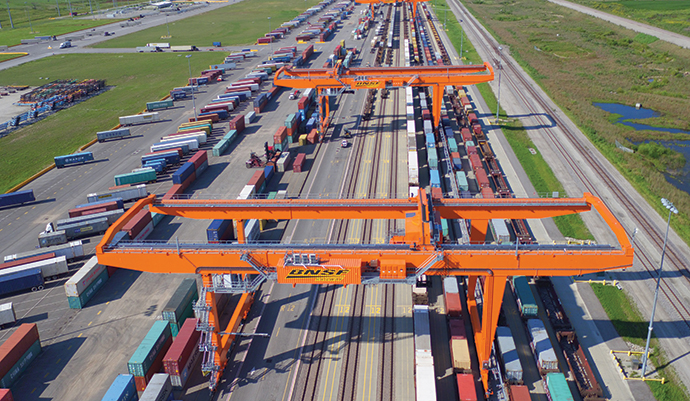The Merriam-Webster Dictionary defines “junction” as “an act of joining; the state of being joined; a place or point of meeting; an intersection of roads; something that joins.”
By that definition, Junction City more than lives up to its name as a place that connects not only people, places and things, but also the ideas that drive business success.
Located at the confluence of the Smoky Hill and Republican rivers in Geary County, Kansas, Junction City is situated at the geographic center of the United States.
But it doesn’t just sit there. Like the dictionary definition, Junction City actively joins multiple parties in ways that may not seem obvious at first, but are integral to economic success and the safety and security of the free world.
“Our biggest site selection advantage is our location,” says Allen Dinkel, city manager of the 27,000-resident town an hour’s drive west of state capital Topeka on Interstate 70. “With our proximity to Topeka, Manhattan, Kansas City and other large cities, we have no shortage of qualified workers.”
With rail access via Union Pacific, shovel-ready Tom Neal Research Park, plenty of land available for growth, five exits off the main east-west route in Kansas, and the largest lake in the state (Milford Lake, with 163 miles of shoreline), Junction City offers every essential element of infrastructure and quality of life for expanding businesses, says Dinkel.
And the trump card? “That’s easy,” Dinkel says. “It’s our connection with Fort Riley, the largest employer in the state of Kansas.”
Home of the 1st Infantry Division — the Big Red One, which celebrated its 100th birthday on June 8 — Fort Riley is home to 30,000 military and civilian personnel.
“With so many career military veterans retiring and choosing to remain in the Junction City area, it makes us very unique,” Dinkel says. “I don’t think there is a city in Kansas that embraces diversity more than we do. People here embrace all cultures. And we have those rural Kansas values of honesty, hard work and dedication. We try to earn the dollar you pay us.”
No one knows that any better than Mark Burris, an oil and gas business investor who’s betting big on the fortunes of Junction City. Burris recently bought the old Florence Manufacturing warehouse on Old Highway 40 and is converting it into the new home of Superior Products.
“The number one factor that drove me to select Junction City is the anticipated labor pool at wages that fit our business,” he says. “We are moving from Iola which has only 5,700 people. By moving here, I can tap into a more qualified labor pool and hire more professional people like engineers and engineering techs.”
With Kansas State University just 20 minutes away in Manhattan, Burris says he’s confident his oil and gas product manufacturing business will thrive. “We do machining, manufacturing and assembly, and we needed warehouse space,” he notes. “This 40,000-sq.-ft. facility offers ample space for us to grow.”
The Kansas Department of Commerce and the Junction City Area Chamber of Commerce provided assistance in the move, adds Burris. “The tax structure in Kansas is very nice. Having no inventory tax is huge. The taxes on machinery in Kansas are conducive to manufacturers. And the quality of people here, given our proximity to Fort Riley, is very high.”
Burris says his firm will start with 10 workers in Junction City; he plans to double that workforce over the next three years.
He is not alone. At Ventria Bioscience Inc., CEO Scott Deeter says, “We made the decision to locate our business in Junction City because of access to sophisticated workers in our field.”
A developer and manufacturer of bio-reagents and bio-therapeutics, Ventria relies heavily on the talent and R&D coming out of places like KSU in Manhattan, Kansas University in Lawrence, Wichita State University and Fort Hays State University.
“Locating here gives us the benefit of a lot of talented labor related to the mechanical processes we employ,” says Deeter. “We were recruited and welcomed by the city with open arms. It is very easy to work with the city and utilities here. They are receptive to the requirements of business. With low costs for electricity and natural gas and an abundant supply of water, we have everything we need in Junction City to grow.”
He adds that the intersection of several major interstates and state highways in the region “allows us to get our products to market very quickly. Interstates 70, 35 and 135 are all right here. That provides very easy access in and out.”
Ventria is investing $10 million into its new Junction City facility and about $85 million into its R&D operation while creating about 30 jobs in the community.
“Since we made the decision to locate in Junction City, it has exceeded our expectations,” Deeter says. “Of all the places we have operated, there is nothing close to the talent, discipline and dedication of the workforce here. The productivity of the Junction City workforce is unparalleled. The work ethic of the community is amazing and it brings the Midwestern values of honesty and integrity to work every day.”
In fact, adds Deeter, the Junction City plant has been so successful that Ventria is already talking expansion. “We are in the middle of an expansion plan right now. We will add more workers to this location,” he notes.
“We are very glad to be in Junction City,” he says. “It is a hidden gem.”
This Investment Profile was prepared under the auspices of the Junction City Area Chamber of Commerce. For more information, contact Mickey Fornaro-Dean at 785-762-1976 or mickey.dean@jcacc.org. On the web, go to www.jcgced.com.

